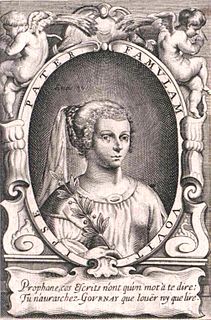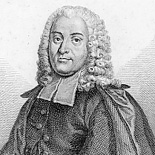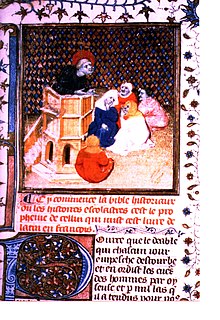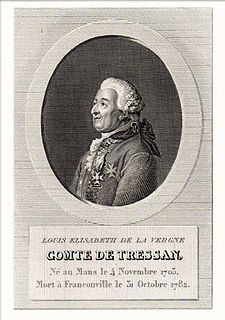Related Research Articles
Étienne Aignan was a French translator, political writer, librettist and playwright. In 1814 he was made a member of the Académie française, succeeding Bernardin de Saint-Pierre in Seat 27. He died on 21 June 1824 aged 51 years old.

Louis-Honoré Fréchette,, was a Canadian poet, politician, playwright, and short story writer. For his prose, he would be the first Quebecois to receive the Prix Montyon from the Académie française, as well as the first Canadian to receive any honor of this kind from a European nation.

Marie de Gournay was a French writer, who wrote a novel and a number of other literary compositions, including The Equality of Men and Women and The Ladies' Grievance. She insisted that women should be educated. Gournay was also an editor and commentator of Michel de Montaigne. After Montaigne's death, Gournay edited and published his Essays.
The Patrologia Orientalis is an attempt to create a comprehensive collection of the writings by eastern Church Fathers in Syriac, Armenian, Arabic, Coptic, Ge'ez, Georgian, and Slavonic, published with a Latin, English, Italian or mostly French translation. It is designed to complement the comprehensive, influential, and monumental Latin and Greek patrologies published in the 19th century. It began in 1897 as the Patrologia Syriaca, was discontinued in its original form and replaced by the Patrologia Orientalis. The collection began with those liturgical texts that touch on hagiography. Since then critical editions of the Bible, theological works, homilies and letters have been published.
Joseph Héliodore Sagesse Vertu Garcin de Tassy was a French orientalist.

Charles Cotin or Abbé Cotin was a French abbé, philosopher and poet. He was made a member of the Académie française on 7 January 1655.

The Abbé Pierre François Guyot-Desfontaines was a French journalist, translator and popular historian.

The Bible Historiale was the predominant medieval translation of the Bible into French. It translates from the Latin Vulgate significant portions from the Bible accompanied by selections from the Historia Scholastica by Peter Comestor, a literal-historical commentary that summarizes and interprets episodes from the historical books of the Bible and situates them chronologically with respect to events from pagan history and mythology.

Louis-Élisabeth de la Vergne, comte de Tressan was a French soldier, physician, scientist, medievalist and writer, best known for his adaptations of "romans chevaleresques" of the Middle Ages, which contributed to the rise of the Troubadour style in the French arts.
Donatien Alphonse François de Sade, best known as the Marquis de Sade, was a French aristocrat, revolutionary and author of philosophical and sadomasochistic novels exploring such controversial subjects as rape, bestiality and necrophilia. His works evidence a philosophical mind advocating a materialist philosophy in which Nature dictates absolute freedom, unrestrained by morality, religion or law, with the pursuit of personal pleasure as its foremost principle. Besides novels, he wrote philosophical tracts, novellas, short tales, and a number of plays. Publication, dissemination, and translation of his works have long been hindered by censorship: not until 1983 were his works allowed unfettered distribution in the UK, for instance.
Claude Gros de Boze was a French scholar and numismatist.
Jean Barbier d'Aucour was a French lawyer to the parliament of Paris, ardent Jansenist and satirist. He wrote anti-Jesuit pamphlets in prose and verse.
Geneviève Fraisse is a French philosopher and an historian of feminist thought.
Geneviève Hasenohr is a French philologist and prolific scholar of medieval and Renaissance French literature. She has authored or contributed to more than forty books, written at least fifty academic articles and reviews, and prepared numerous scholarly editions.
Pierre Chompré, was a French schoolmaster, author of educational books and Latin sermons editor.

Pierre Adolphe Capelle was a 19th-century French chansonnier, goguettier and writer.
Jean-Auguste Jullien, called Desboulmiers, 1731, Paris – 1771, Paris, was an 18th-century French man of letters, historian of theatre and playwright.

Pierre-Joseph Charrin was a 19th-century French poet, chansonnier, playwright and goguettier.
Ernest Fouinet was a 19th-century French novelist and poet.
References
- ↑ Emmanuel Pétavel-Olliff, 1836-1910: souvenirs et mélanges publiés ed. Henri Narbel - 1913
- ↑ Permanences et mutations dans la société israélienne Carol Iancu - 1996 "Ce dernier, pasteur neuchâtelois, est aussi l'auteur d'un poème en sept chants, La Fille de Sion ou le Rétablissement d'Israël."
- ↑ Jacques Picard La Suisse et les Juifs 1933-1945: Antisémitisme suisse, défense du judaïsme, politique internationale envers les émigrants et les réfugiés. Translated from German by Ursula Gaillard and Marianne Enckell. 2000 - p81- "Parmi eux, il faut citer le Neuchâtelois Abram-François Pétavel et le Genevois Emile Guers pour le XIXe siècle."
- ↑ Encyclopédie des sciences religieuses: Vol.13 ed. Frédéric Lichtenberger - 1882 "PETAVEL-OLLIFF (Emmanuel), théologien suisse, fils d'Abram-François ... 1868) ; « l'Egalité chrétienne » [discours, 1869); « la Loi du Progrès» (conférence apologétique, 1869) ; « Lettre d'un ministre protestant à SM le roi de Prusse
- ↑ Raoul Dederen Un réformateur catholique au XIXe siècle: Eugène Michaud (1839-1917) 1963 p338 "En 1866, Emmanuel Pétavel- Oliff ayant conçu le dessein de publier une nouvelle traduction française de la Bible, voulut, pour en assurer le succès, la faire paraître sous le patronage d'une « société nationale » embrassant des nommes..."
- ↑ La Contre-reforme Devant la Bible p484 "Cette association, dont le pasteur Emmanuel Pétavel-Oliff fut la cheville ouvrière, groupait des personnalités catholiques, protestantes, juives, indépendantes. Elle se proposait, avec le concours des érudits et des écrivains les plus .."
- ↑ The Thinker: a review of world-wide Christian thought: Vol.2 1892 "Dr. Petavel is known in England chiefly on account of his little book The Struggle for Eternal Life, which attracted some attention during the earlier days of the Conditional Immortality controversy. The present volume is a translation"
- ↑ Stephen Travis - 1980 - p143 "... was the Swiss Emmanuel Petavel-Olliff, whose main book (1891) appeared in English ..."